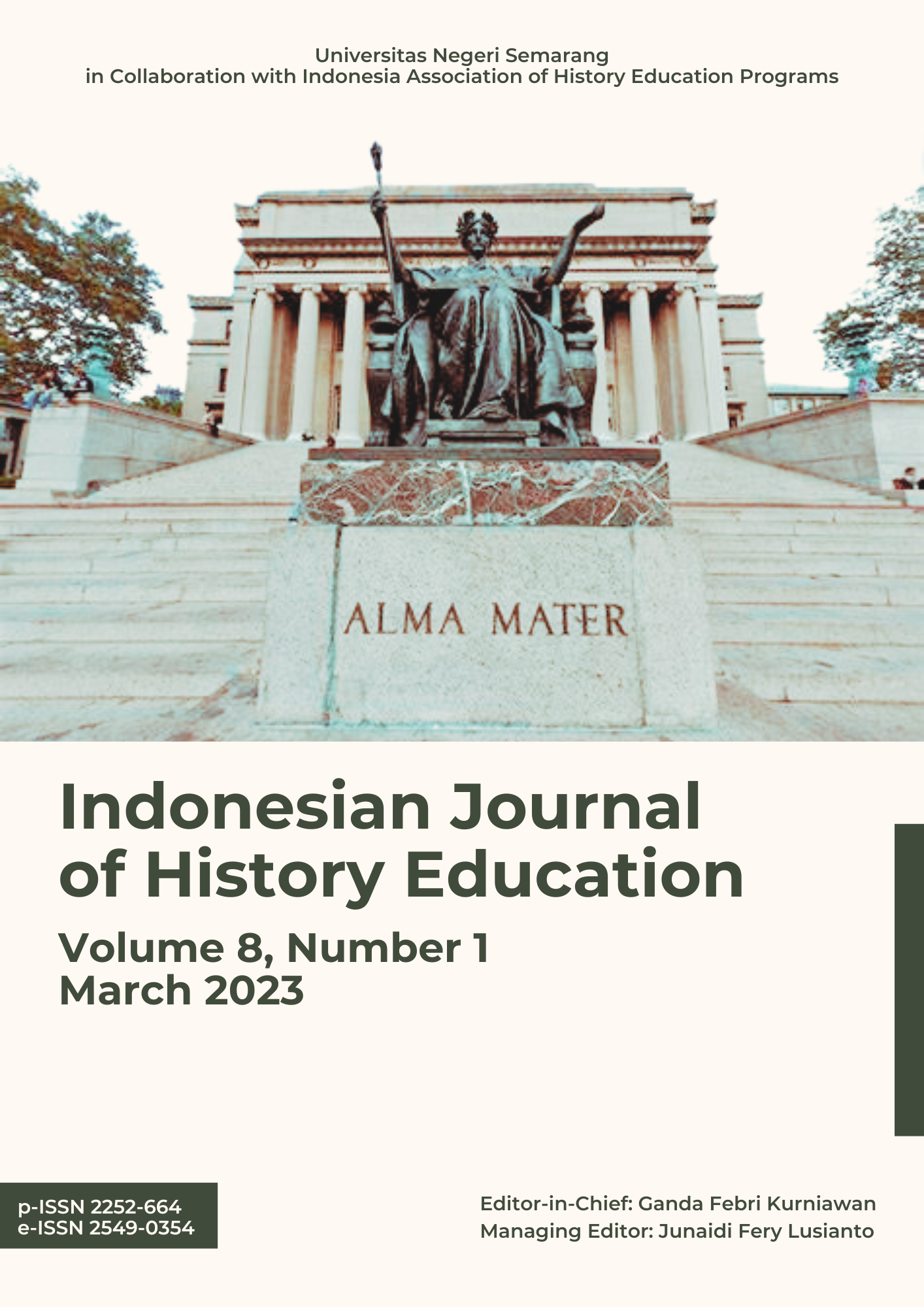Alternative Narratives in History Learning for Multicultural Education in Indonesia
Abstract
Indonesia is currently experiencing symptoms of strengthening identity politics. As a pluralistic nation, this phenomenon is dangerous because it can lead to social conflict and national disintegration. This research was conducted with the aim that educational institutions can play a role in minimizing this potential. What he can do is instill the values of multiculturalism in learning practices, especially in history learning. For this reason, the problems that are tried to be put forward in this research are: 1) what is meant by multiculturalism education? 2) what is the conception of multiculturalism education in history learning? 3) how can a multiculturalism narrative be developed in history learning materials? This research uses a literature study method. The literature study obtained data from several library sources such as journal articles, books, the internet, newspapers, and magazines. The study revealed that multiculturalism education is a concept created to help someone understand and appreciate regardless of the high or low culture, ethnicity, religion, race, gender, language, economic ability, or disability inherent in a person. Learning history with a multiculturalism approach is ideological. In history learning, multiculturalism education can be carried out by accommodating students' cultural differences, utilizing culture as a source of content, and using history as a tool to understand other people's cultures in order to grow mutual respect, tolerance, a sense of unity and the spirit of nationalism. A historical event that can be used as an alternative narrative in the development of multiculturalism education is when Suharto, at the beginning of his reign, tried to re-establish Pancasila and the 45' constitution as the ideology and basis of the state amid the threat of ideological conflicts between political parties and the emergence of an inclusive Islamic movement led by Nurcholish Madjid as a response to the death of the movement Islamic politics during the Orde Baru era.
References
“Revolusi Nurcholish Madjid”. Tempo, 29 Juli 1972.
Abdullah, T. (Ed). (2012). Indonesia dalam Arus Sejarah Jidil 8: Orde Baru dan Reformasi. Jakarta: PT Ichtiar Baru van Hoeve.
Banks, J. A., Cherry A. M. B. (2010). Multicultural Education: Issues and Perspectives. New York: Willey.
Cushner, K., McClelland, A., Safford, P. (2012). Human Diversity in Education: An Intercultural Approach. New York: Mc Graw Hill.
Fernandes, A. (2018). Politik Identitas dalam Pemilu 2019: Proyeksi dan Efektifitas. Jakarta: CSIS.
Hasan, S. H. (2012). Pendidikan Sejarah Indonesia: Isu dalam Ide dan Pembelajaran. Bandung: Rizqi.
Latief, Y. (2005). Intelegensia Muslim dan Kuasa: Genealogi Intelegensia Muslim Indonesia Abad ke-20. Jakarta: Mizan.
Madjid, N. (1987). Islam Kemodernan dan Keindonesiaan. Bandung: Mizan.
Musadad, A. (2015). Model Manajemen Pembelajaran Sejarah Terintegrasi Pendidikan Multikultural Untuk Membangun Wawasan Kebangsaan. Paramita: Historical Studies Journal, 25(2), 247-260.
Parekh, B. (2000). Rethinking Multiculturalism: Cultural Diversity and Political Theory. London: Macmillan Press.
Race, R. (2011). Multiculturalism and Education. London: Continuum.
Supardan, D. & Mulayana, A. (2008). Multiculturalism And Multiculturalism Education In Indonesia: Opportunities And Challanges. Paper presented on the “International Seminar” in Education Faculty-University Kebangsaan Malaysia and was posted in Mulyana, A. & Supardan, D. (Ed). Sejarah Sebuah Penilaian: Refleksi 70 Tahun Prof. Dr. H. Asmawi Zainul, M.Ed. Jurusan Pendidikan Sejarah FPIPS Universitas Pendidikan Indonesia, Bandung.
Wineburg, S. (2006). Berfikir Historis: Memetakan Masa Depan, Mengajarkan Masa Lalu. Jakarta: Yayasan Obor Indonesia.
Zed, M. (2004). Metode Penelitian Kepustakaan. Jakarta: Yayasan Obor Indonesia.
Copyright (c) 2023 IJHE

This work is licensed under a Creative Commons Attribution 4.0 International License.
Copyright Notice
An author who publishes in the Jurnal Indonesian Journal of History Education agrees to the following terms:
- Author retains the copyright and grants the journal the right of first publication of the work simultaneously licensed under the Creative Commons Attribution-ShareAlike 4.0 License that allows others to share the work with an acknowledgement of the work's authorship and initial publication in this journal
- Author is able to enter into separate, additional contractual arrangements for the non-exclusive distribution of the journal's published version of the work (e.g., post it to an institutional repository or publish it in a book) with the acknowledgement of its initial publication in this journal.
- Author is permitted and encouraged to post his/her work online (e.g., in institutional repositories or on their website) prior to and during the submission process, as it can lead to productive exchanges, as well as earlier and greater citation of the published work (See The Effect of Open Access).
Read more about the Creative Commons Attribution-ShareAlike 4.0 Licence here: https://creativecommons.org/licenses/by-sa/4.0/.




